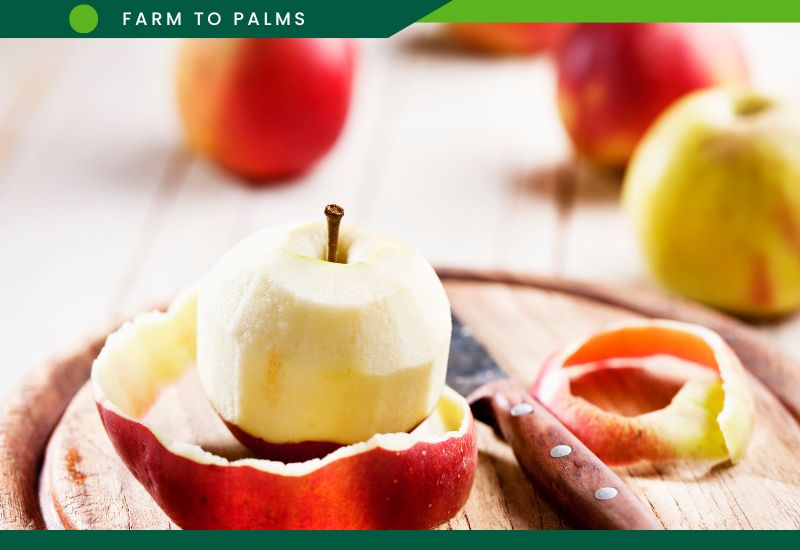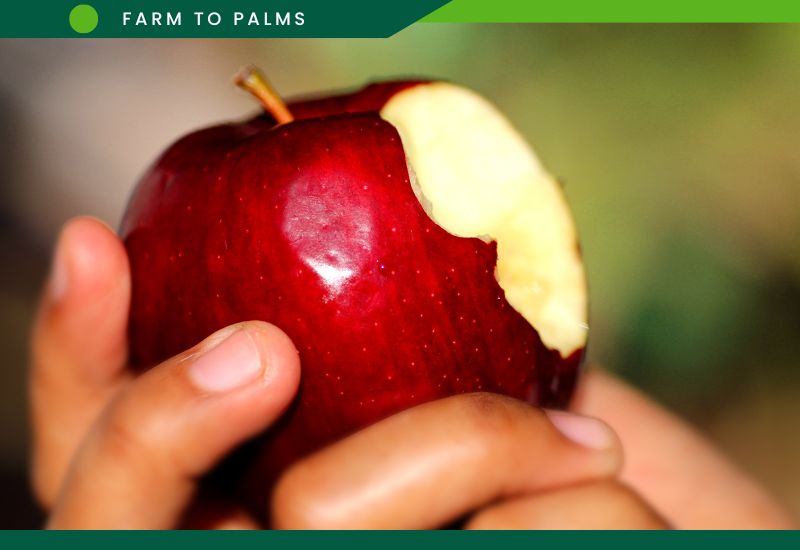When it comes to apples, do you prefer peeled or unpeeled? Regardless of your preference, you may have pondered whether apple peels offer health benefits or hinder the juicy fruit inside.
From a nutritional perspective, apple peels are commonly recognized as advantageous for health. Therefore, it can be affirmed that apple peels positively affect one’s well-being.
Continue reading to discover the precise health advantages they provide.
Benefits of Eating Apple Peels

An apple is a nutritious fruit containing vitamins and minerals like Vitamin C, potassium, fibre, carbohydrates, chlorogenic acid, quercetin, and catechins.
Despite having only 95 calories, a medium-sized apple is rich in polyphenols with antioxidant properties, mainly found in the apple skin.
Nutrition experts recommend eating apples with the skin on for various health benefits:
Fibre

Apple peels are a rich source of both soluble and insoluble fibre. Soluble fibre aids in lowering cholesterol levels, regulating blood sugar, and improving gut health.
Insoluble fibre, on the other hand, supports healthy digestion and helps prevent constipation. The peel of a medium-sized apple provides around 4.4g of fibre (soluble and insoluble), aiding in digestion, satiety, blood sugar control, nutrient absorption, and cholesterol reduction.
Antioxidants

Apple peels contain various antioxidants, such as quercetin, catechin, and chlorogenic acid. These antioxidants reduce the risk of chronic diseases like heart disease, cancer, and diabetes by neutralizing harmful free radicals in the body that can damage cells and contribute to disease development.
Vitamins & Minerals

Apple peels contain essential vitamins such as 8.4mg of Vitamin C, and 98 IU of Vitamin A. Peeling reduces the vitamin content to 6.4mg of Vitamin C and 61 IU of Vitamin A.
Vitamin C is an antioxidant that bolsters the immune system and aids collagen production. Vitamin A is crucial for vision and skin health, vitamin K plays a role in blood clotting, and potassium is vital for heart and muscle function.
Apple skin also contains vital minerals like potassium, calcium, folate, iron, and phosphorus, supporting overall body development, bone strength, cell regulation, and red blood cell production.
Phytonutrients

Apple peels harbour a variety of phytonutrients, natural compounds in plants known for their health-promoting properties. These phytonutrients have been linked to anti-inflammatory and anti-cancer effects, among other potential health benefits.
Increased Ursolic Acid

This compound found in peels may benefit blood sugar control and weight management, but more research is needed.
Cancer Prevention

According to a study conducted in Finland, individuals who consumed five apples per week exhibited the lowest incidences of diabetes, heart disease, and cancer.
An unpeeled apple contains 50% more phytonutrients than a peeled one.
The skin of apples boasts remarkably high levels of antioxidants and triterpenoids, compounds known for their potent anti-cancer properties. Specifically, apple peels have shown promising effects in preventing liver, colon, and breast cancer. Studies suggest that apple peels and extracts may also contribute to reducing the risk of various types of cancer.
Given the plethora of health benefits associated with apple skins, weighing the advantages and disadvantages of including them in one’s diet is prudent.
Respiratory Health

Quercetin in apple skin improves lung function, potentially reducing asthma risk and combating tissue damage in degenerative disorders like Alzheimer’s.
Weight Loss

The ursolic acid in apple peels aids weight loss by increasing muscle mass and burning body fat.
Drawbacks of Eating Apple Peels

Pesticide Residue
Conventionally cultivated apples may contain pesticide residues on their peels. Although diligent washing can mitigate this issue, traces of pesticides may still persist.
Digestive Issues
The elevated fibre content in apple peels can lead to digestive discomfort for individuals with sensitive digestive systems.
Taste and Texture
Certain individuals may perceive apple peels as having a bitter taste or a challenging texture to chew.
So, Peel or Not to Peel?

The choice of whether or not to consume the peel is contingent upon individual preferences and priorities:
- For individuals worried about pesticide residue: Opt for organic apples or ensure thorough washing with a designated fruit and vegetable cleanser.
- If you have a delicate digestive system: Consume small quantities of the peel and observe your personal tolerance levels. Alternatively, consider partially removing the peel while retaining some fibre-rich skin.
- In case of aversion to the taste or texture: There is no necessity to compel oneself. Nutrients can still be obtained from the flesh of the apple.
Conclusion
Apple peels are packed with essential nutrients like fibre, antioxidants, vitamins, minerals, phytonutrients, and Ursolic acid, offering numerous health benefits such as improved digestion, reduced risk of chronic diseases, cancer prevention, respiratory health, weight loss, and more.
However, there are concerns regarding pesticide residues, digestive issues, and taste preferences when consuming apple peels. To make a wise choice, opt for organic apples or wash thoroughly to reduce pesticide exposure, drink small amounts for sensitive digestive systems, and peel if taste or texture is a concern. For sweet apples, consider purchasing them at Farm to Palms supermarket.

